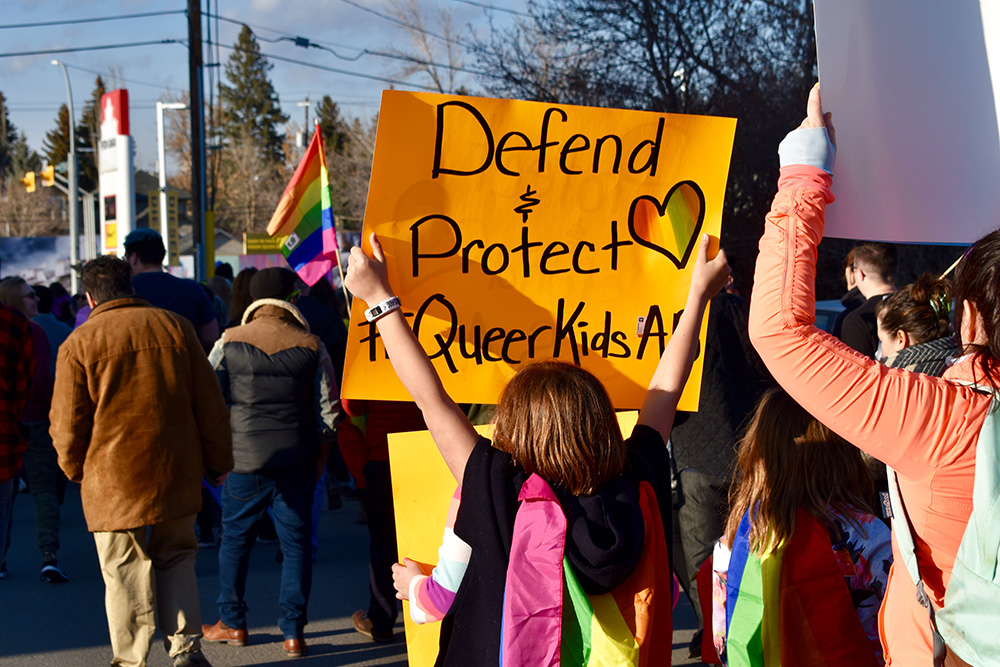With an Alberta election on Tuesday, party leaders are declaring their positions. A topic that has captured headlines in recent weeks involves an unlikely focus — namely, school clubs that support students who identify as lesbian, gay, bisexual, transgender/two-spirited, queer and others (LGBTQ+).
These school groups, commonly known as gay-straight alliances or GSAs, offer a safe and collegial gathering place for any students who seek to improve a school’s climate for gender and sexual minority students.
It is important to know that GSAs have only existed in Alberta for less than two decades. In my past career as a high school teacher, I was honoured to help a small group of students found the first GSA in Alberta at Lindsay Thurber Comprehensive High School in Red Deer in 2000.
In a relatively conservative social climate, courageous students convinced our principal and staff the group was needed to help students feel safer at school. At a memorable staff meeting, a few brave students stood in front of more than 100 adults. They talked candidly about growing up gay in Red Deer, about wishing to be like the cast members of the popular sitcom Friends, but knowing they were somehow different.
Their stories were unscripted and compelling — and they touched the hearts of all who listened. Our GSA held weekly meetings, made posters with inclusive messages, organized awareness events and offered support for all students.
Today the Alberta GSA network has 78 registered clubs and a wealth of strong resources to guide the formation and sustenance of these groups.
Legislated protection for GSAs under threat
A public debate around GSAs in schools and other issues around sexual orientation during the 2015 election may have bolstered the NDP’s success. The party fulfilled its election promise to support those students by enshrining their right to form a GSA with Bill 24.
The Act to Support Gay-Straight Alliances came into effect April 1, 2018. This act requires all publicly funded schools to create welcoming, caring and respectful policies and make the policies publicly available, and ensures principals help students create a GSA in a timely manner when one is requested.
Further, the act ensures schools comply with the law. Schools that do not put in place a relevant written policy and code of conduct, or who disallow the formation of a GSA, are subject to removal of public funding.
Today, research is clear that the existence of a gay-straight alliance in a school will improve the learning environment for all of the students there, and particularly for sexual minority students. Safer schools benefit everyone.
In hostile school environments, LGBTQ+ students are more likely to be targets of bullying, to struggle with higher rates of absenteeism, self-harm, suicide and generally more negative mental health outcomes.
But GSAs have come into United Conservative Party Leader Jason Kenney’s crosshairs. One of his campaign promises is to roll back GSA legislation: Kenney has proposed allowing school officials to notify parents when their child joins a GSA. Such a move could jeopardize student safety.
A political candidate threatening to remove important protections for some of our province’s most vulnerable students may well turn off many voters.
I learned as a teacher that there are many reasons students may wish to join a GSA. Allowing schools to disclose membership to parents would put many students at additional risk.
Some of the students attending our GSA meetings did not enjoy supportive home environments, and there is no benefit to effectively “outing” students merely for attending a meeting. Some attendees are straight allies wishing to learn more about how to support their peers, or they may simply want to better understand the complex issues around sexual orientation and gender identity.
Narrow and unsuited?
Issues surrounding sexual orientation also came to the fore during the 2012 Alberta election, when the fledgling Wildrose Alliance Party attracted a number of candidates with extremist views. Candidate Allan Hunsperger wrote in a blog that homosexuals would suffer the rest of eternity in the lake of fire, and then-Wildrose leader Danielle Smith’s refusal to admonish him or distance herself from his views are regarded as factors in her loss.
Last November, UCP candidate and Calgary lawyer John Carpay appeared to compare rainbow flags to swastikas. During Carpay’s court challenges of the GSA law in 2018, court documents called GSAs “ideological sexual clubs.”
Just last week, a 2013 recording surfaced in which UCP candidate Mark Smith came under scrutiny for comments appearing to question if “homosexual love” is real love. Kenney stood by Smith, risking alienating voters who may already be concerned by his own past anti-LGBTQ+ positions.
Further, the NDP recently released a campaign attack video that draws attention to a decades-old video showing a younger Kenney discussing leading a petition against gay spousal rights in San Francisco.
Put together with his promise to roll back protections for students wishing for the support of a GSA in their school, Kenney’s consistently narrow views on this matter may signal to voters that he is unsuited to lead the province.
Today we are not living in the Alberta of earlier generations, and many signs point to a more accepting and open-minded population. The most recent Calgary Pride parade saw record-setting crowds numbered in the tens of thousands. As more Albertans than ever before support equality and human rights for all, GSA policies may well be a lightning rod issue that influences Alberta voters.
![]()
![]()
Read more: Rights + Justice, Politics, Gender + Sexuality
















Tyee Commenting Guidelines
Comments that violate guidelines risk being deleted, and violations may result in a temporary or permanent user ban. Maintain the spirit of good conversation to stay in the discussion.
*Please note The Tyee is not a forum for spreading misinformation about COVID-19, denying its existence or minimizing its risk to public health.
Do:
Do not: